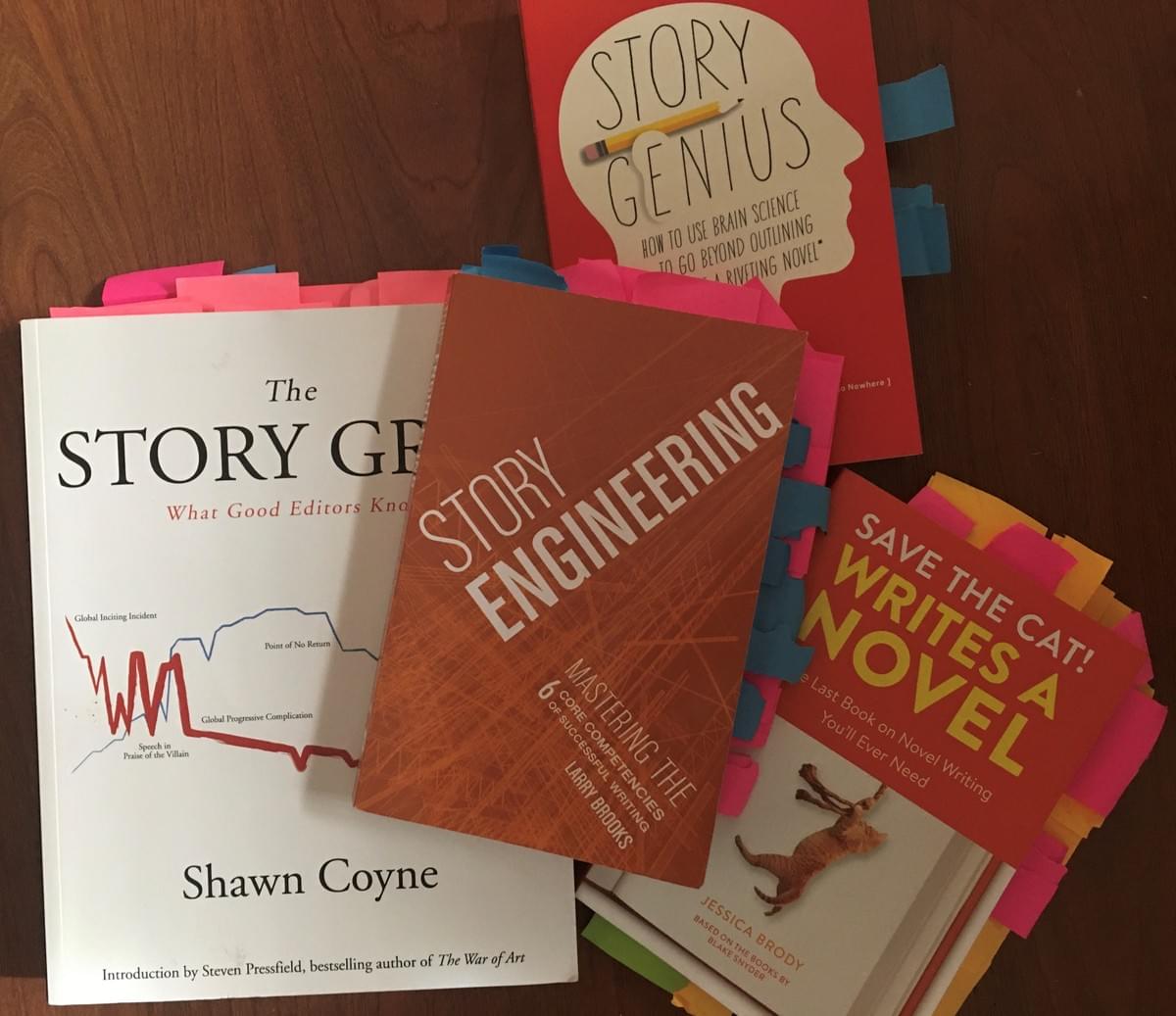
I did a deep-dive into plotting and structure over December and used these four books to do it. Previously I've sung the praises of Story Genius, and I still do like Lisa Cron's concept of the MC having a fundamental misconception about themselves or their story world (preferably one that intertwines in both A & B plot arcs), and her website has great free resources for writers, but...
Story Grid, by Shawn Coyne, was good, if a bit depressing to read, to be honest, and some of the movie scripts he criticized heavily I thought were downright brilliant.
I've got to say, Story Engineering and Save the Cat! are my new go-to books regarding plot and structure. Jami Gold offers worksheets that show how the beat sheeting mentioned in these two books overlaps with a typical 3-Act story structure.
I also attended a fair number of plotting workshops last year.
YALL Write's The Story Corpse online course with V.E. Schwab was fantabulous! The analogy of building a story around a corpse, from bones to flesh to the artistic flair of the makeup and tattoos and the like, is brilliant!
Through my local Sisters in Crime chapter, the "Finding the Perfect Story Structure," with Kevin Ikenberry, course also offered an absolutely FANTASTIC graphic overlaying four (4) plot structures and how they align: a simplified Hero's Journey, the 7-Point Plot Structure, The Hollywood Formula (both of which were totally new to me), and a typical 3-Act structure. If you can find an organization that's bringing him in to teach this, I highly recommend it!
I did all this to prepare to write three new books this year.
My new drafts will be brand-spanking-new stories, like my Babytime on the Border (which started as a 40K NaNoWriMo characterization many, many years ago!), but I'll be practicing the new story structures I've studied, and do things I absolutely loathe to do, like "write with a theme in mind." Really, it is important, and I'll be trying to hit some of these common reader expectations for storytelling before I draft, as opposed to after.
I have one 40-beat sheet under development (it's almost finished!), tentatively titled Dragons' Journey. It's a tale of finding hope for a species after centuries of over hunting and in the face of a warming climate, and it's almost ready for me to start drafting. But if it's one thing beat sheeting teaches you, there's so much to work out, like the final in-the-air battle scene, so I'm not drafting blind.
I'm also using what I've learned to re-plot and rewrite my MG MS, Dragon Scales. The concept has received a lot of enthusiasm, and it got two requests from Pitch Wars mentors. One team, Team KrackenBee, gave me amazing feedback! I struggled with how to incorporate it, until I decided to re-plot and rewrite the entire thing. Ironically, what they recommended is closer to what I wanted to do with the story originally, but lost sight of while I was writing (a drawback to "pantsing"). In deciding to do this rewrite, I'm going to go about it significantly different than what I did for Dragon's Leap, which was a long, slow process of layering in plot elements and taking away others (and took 16 versions, and still isn't exactly what I want it to be!). This time, I'm employing all I've learned about story structure so the MS more closely follows a tight plot structure. I've got to say: Dragon Scales is probably the last MS I ever "pants"!
It may sound ambitious, but I wrote two books last year (Dragon Scales, at 75K, and Babybtime, at 88K), without planning on it, thanks to COVID and sheltering in place, so I know I can do it.
The first is a high-fantasy YA dragon story, the second a climate-magic MG story, and the third is an adult science fiction retelling of a popular, if very old, Alexandre Dumas book in a Quirk Books / Ben Winters-esque style "second pass." The last is perhaps my biggest and most ambitious project, and to do it, will take a fair bit of planning well in advance.
To do this much writing, I'm marshaling screenwriting resources -- namely, mining Noam Kroll's blog. I've mentioned his beat sheets before (attached), and I've looked at others (namely Jami Gold's Worksheets for Writers).
Kroll's blog posting, An Actionable Formula for Plotting Your Next Screenplay was exactly what I needed this past month to get me started beat sheeting my high fantasy piece.
As I said, it's ambitious, but I really feel it can be done. Wish me luck!
